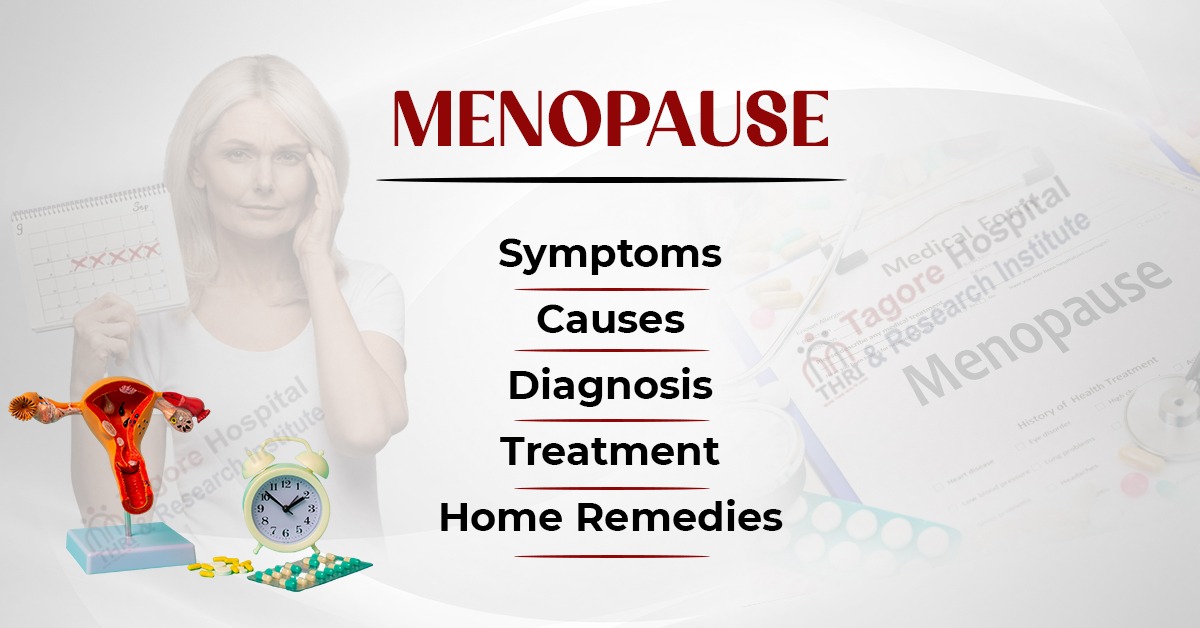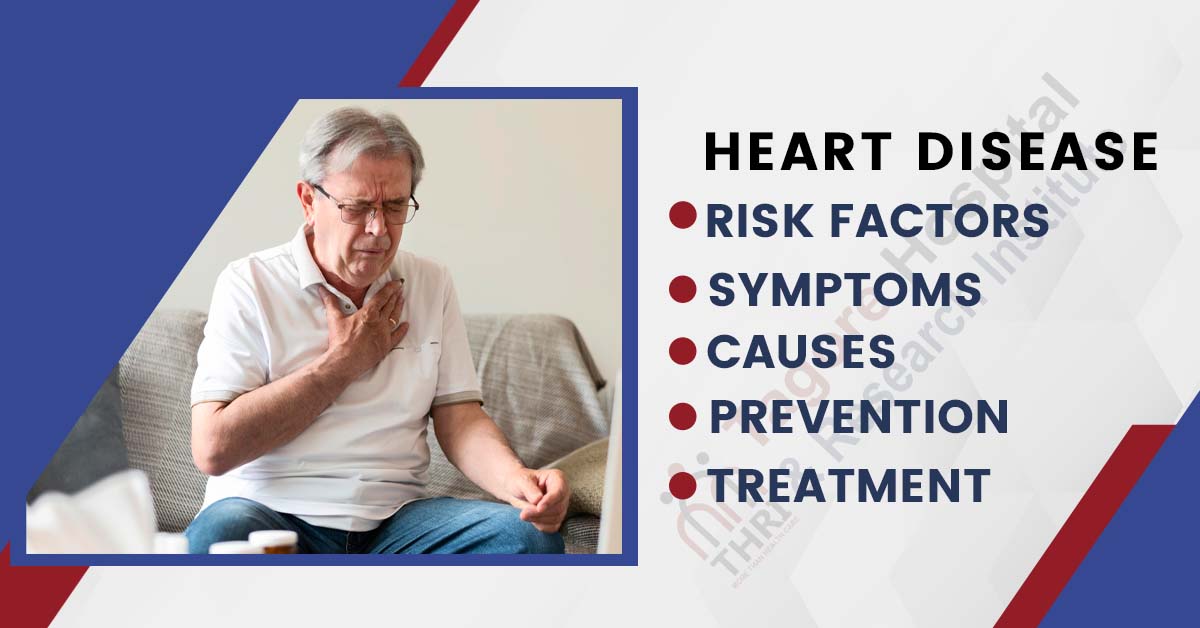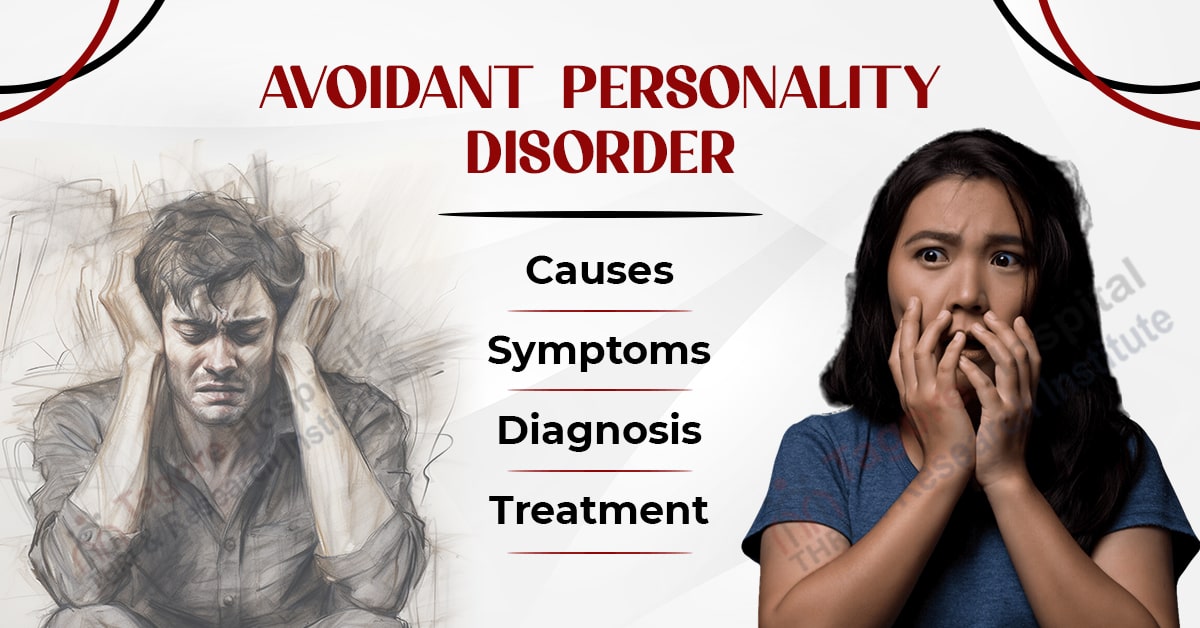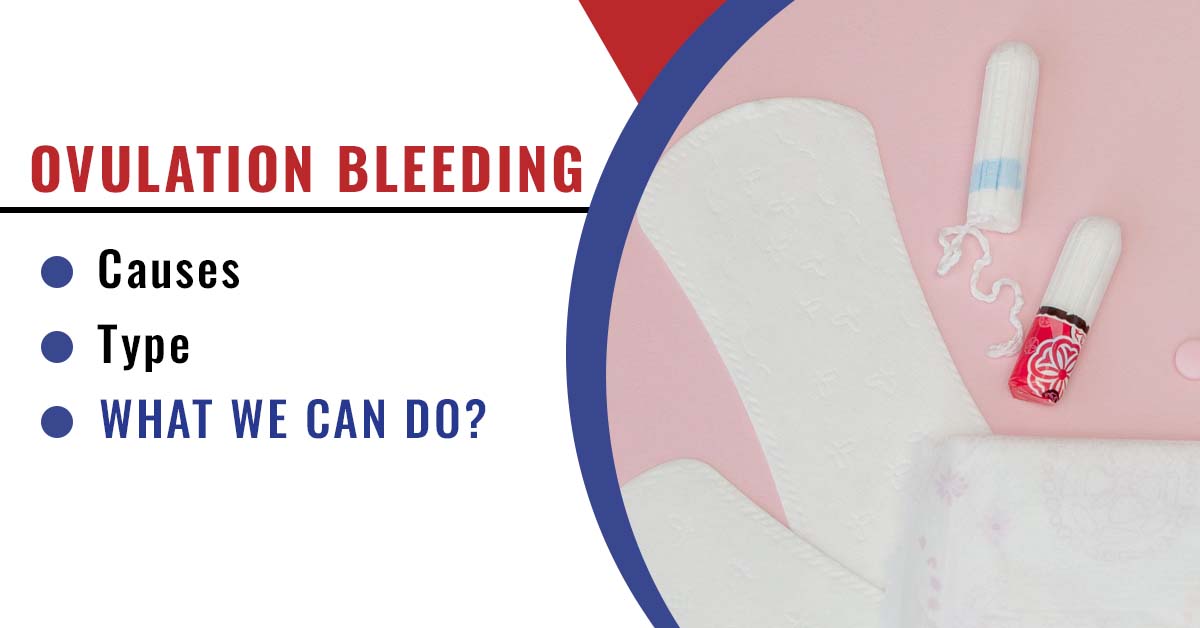- By Tagore Admin
- Posted August 11, 2023
Overview
The end of a woman's reproductive years is signalled by menopause, it is a natural biological process. It typically occurs in middle age, usually between the ages of 45 and 55, although the exact timing can vary widely among individuals.
During menopause, a woman's ovaries gradually produce fewer reproductive hormones, particularly estrogen, and progesterone, leading to the cessation of menstruation and the end of fertility.
Symptoms of Menopause
It typically occurs in their late 40s to early 50s. Here are some common symptoms of menopause:
● Hot Flashes: Heat waves that come on suddenly and intensely, frequently accompanied by perspiration and flushing.
● Night Sweats: Similar to hot flashes, occurring during sleep and leading to excessive sweating.
● Irregular Periods: Menstrual cycles become less predictable, often with longer gaps between periods.
● Vaginal Dryness: Reduced lubrication in the vaginal area, leading to discomfort or pain during intercourse.
● Mood Changes: Fluctuations in hormones can lead to mood swings, irritability, and even mild depression or anxiety.
● Sleep Disturbances: Insomnia or disrupted sleep patterns are common during menopause.
● Fatigue: Many women experience increased tiredness and reduced energy levels.
● Changes in Sexual Desire: Some women may experience a decrease in sexual desire or libido.
● Urinary Symptoms: Increased frequency of urination and occasional urinary incontinence.
● Joint and Muscle Aches: Some women may experience joint and muscle pain or stiffness.
Causes of Menopause
Menopause is primarily caused by age-related changes in a woman's reproductive system. The key factors include:
● Aging: As women age, their ovaries produce fewer reproductive hormones, leading to the end of menstruation.
● Ovarian Aging: Ovaries become less responsive to hormonal signals, reducing egg release and hormone production.
● Genetics: Family history can influence the timing of menopause.
● Hysterectomy: Surgical removal of the uterus and ovaries can cause sudden menopause.
● Cancer Treatments: Chemotherapy and radiation therapy can damage ovaries, leading to premature menopause.
● Autoimmune Disorders: Some autoimmune conditions can trigger earlier menopause.
● Primary Ovarian Insufficiency (POI): Ovaries stop functioning before age 40.
● Lifestyle: Smoking and certain lifestyles might lead to earlier menopause.
● Ethnicity/Geography: Different groups may experience menopause at varying ages.
You Can Read also: Infected Stitches
Diagnosis of Menopause
The diagnosis of menopause is usually based on a combination of symptoms and changes in hormone levels. Here's how it's typically diagnosed:
● Age and Symptoms: Women who are in their late 40s to early 50s and start experiencing certain symptoms may suspect they are approaching menopause. Common symptoms include irregular periods, hot flashes, night sweats, mood swings, vaginal dryness, and changes in sleep patterns.
● Follicle-Stimulating Hormone (FSH) Test: One of the most common tests used to diagnose menopause is the FSH blood test. FSH is a hormone released by the pituitary gland that stimulates the ovaries to produce estrogen and develop eggs. As a woman goes through menopause, her estrogen levels decrease, leading to an increase in FSH levels. If a woman's FSH levels are consistently elevated on two separate tests, it could indicate that she is in menopause.
● Estradiol Level: Estradiol is a type of estrogen. Low levels of estradiol can also be an indicator of menopause. If a woman's estradiol levels are consistently low, along with elevated FSH levels, it suggests that she is in menopause.
● Medical History and Physical Examination: A doctor will usually take a detailed medical history and perform a physical examination. They will ask about your symptoms, menstrual history, and any changes you've noticed. This can help rule out other potential causes of your symptoms.
● No Menstrual Periods: One of the hallmark signs of menopause is the absence of menstrual periods for 12 consecutive months. If you have not had a period for a year and are experiencing other symptoms of menopause, you have likely entered menopause.
You Can Read Also:- Hair Loss: Causes, Symptoms, and Treatment & Prevention
Treatment of Menopause
The treatment of menopause focuses on managing the symptoms and addressing the changes that occur in a woman's body as her reproductive hormones decline. The approach to treatment can vary based on the severity of symptoms, individual health factors, and personal preferences. Here are some common approaches to treating menopause:
● Hormone Therapy (HRT): Hormone replacement therapy involves taking medications that contain estrogen, progesterone, or a combination of both to help alleviate menopausal symptoms. Estrogen therapy can help reduce hot flashes, night sweats, vaginal dryness, and other symptoms. However, HRT is not suitable for everyone, and its use involves careful consideration of risks and benefits.
● Non-Hormonal Medications: There are medications available that can help manage specific symptoms of menopause. For example, selective serotonin reuptake inhibitors (SSRIs) and selective norepinephrine reuptake inhibitors (SNRIs), which are commonly used as antidepressants, can help alleviate mood swings and hot flashes. Medications for osteoporosis might also be prescribed to prevent bone loss.
● Lifestyle Changes: Making healthy lifestyle changes can positively impact managing menopausal symptoms. Regular exercise, maintaining a healthy weight, and eating a balanced diet rich in calcium and vitamin D can help maintain bone health and manage weight changes that often occur during menopause.
● Dietary Supplements: Some women find relief from menopausal symptoms through the use of nutritional supplements, such as black cohosh, soy isoflavones, and red clover. However, the effectiveness of these supplements can vary, and their safety is not always well-established. A healthcare professional must be consulted before beginning any supplement regimen.
● Vaginal lubricants and moisturizers: These over-the-counter products can relieve discomfort and dryness in the vagina. These products help alleviate discomfort during sexual activity and daily life.
● Behavioral Approaches: Techniques such as deep breathing, meditation, and mindfulness can help manage stress, anxiety, and mood swings associated with menopause.
● Complementary and Alternative Therapies: Some women explore complementary therapies like acupuncture, yoga, and herbal remedies. While these approaches may provide relief for some individuals, scientific evidence supporting their effectiveness varies.
Complications of Menopause
Here are some potential complications associated with menopause:
● Osteoporosis: With the decrease in estrogen levels during menopause, women are at an increased risk of developing osteoporosis, a condition that leads to weakened and brittle bones, making them more prone to fractures.
● Heart Disease: The decline in estrogen levels may contribute to an increased risk of heart disease, as estrogen is thought to have a protective effect on the cardiovascular system.
● Vaginal Atrophy and Dryness: Lower estrogen levels can lead to thinning of the vaginal tissues, causing vaginal dryness, discomfort during intercourse, and an increased risk of urinary tract infections.
● Urinary Incontinence: The loss of estrogen can weaken the pelvic muscles and tissues that support the bladder and urethra, leading to urinary incontinence (leakage of urine) and other urinary problems.
● Mood Changes: Hormonal fluctuations during menopause can contribute to mood swings, irritability, anxiety, and depression in some women.
● Sexual Health Issues: Decreased estrogen levels can lead to reduced sexual desire, discomfort during intercourse due to vaginal dryness, and changes in sexual satisfaction.
● Weight Gain: Metabolism tends to slow down with age, and hormonal changes during menopause can contribute to weight gain, particularly around the abdominal area.
● Cognitive Changes: Some women may experience subtle cognitive changes, including difficulty with memory and concentration, although the exact relationship between menopause and cognitive function is still being studied.
Home remedies for Menopause
Menopause is a natural phase in a woman's life marked by the cessation of menstrual periods and a decline in reproductive hormone levels. While home remedies can help manage some of its symptoms, it's important to consult a healthcare professional for personalized advice. Here are a few home remedies that finds helpful:
● Healthy Diet: Eat balanced meals rich in fruits, veggies, whole grains, and lean proteins.
● Herbal Support: Some women find relief from symptoms with herbs like black cohosh or red clover.
● Exercise: Regular physical activity improves mood and overall well-being.
● Stress Management: Yoga, meditation, and deep breathing help reduce stress and hot flashes.
● Hydration: Drink enough water to manage dryness and discomfort.
● Cooling Techniques: Wear light clothes, use fans, and stay cool to ease hot flashes.
● Sleep Routine: Maintain a regular sleep schedule and a comfy sleep environment.
● Vaginal Health: Use water-based lubes or moisturizers for dryness.
Tags





